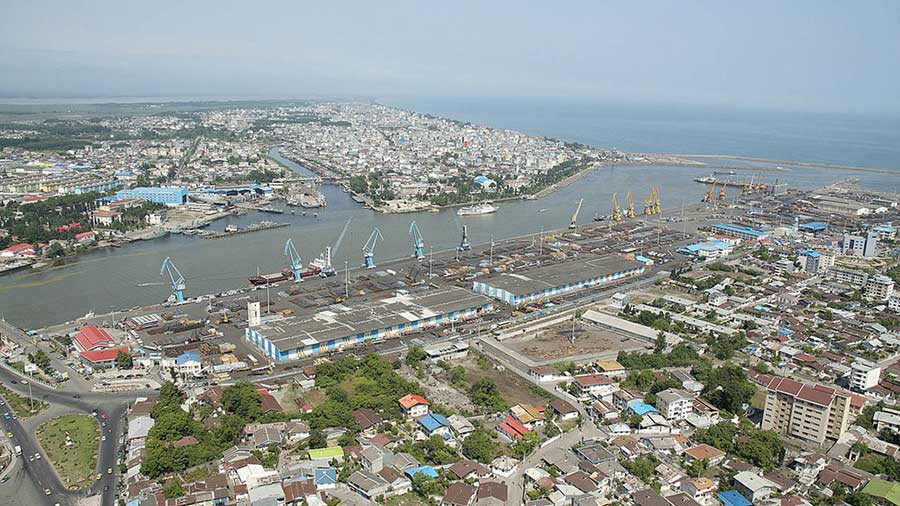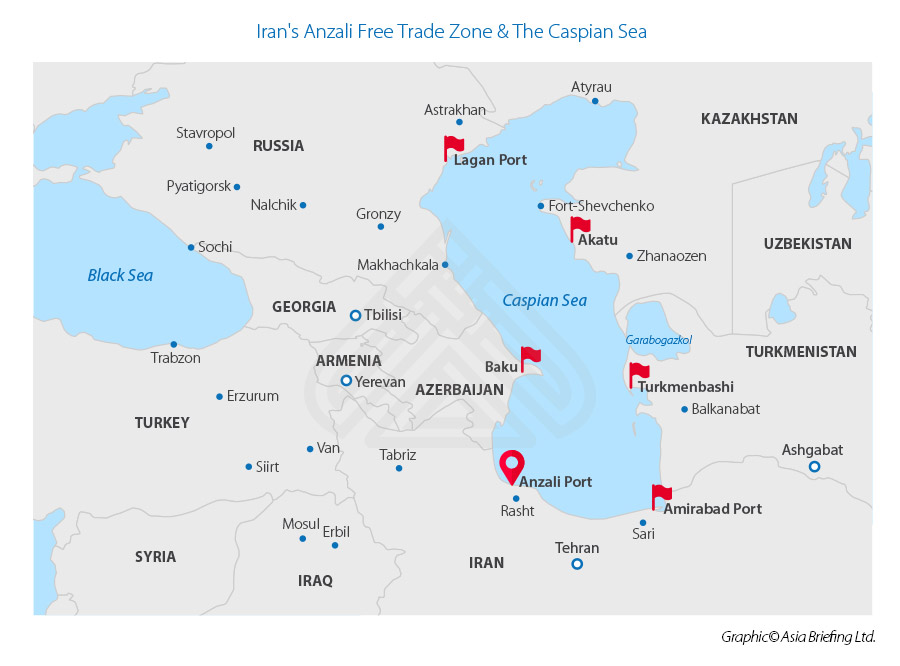Anzali Free Trade Zone: Emerging Iran’s Gateway On The Caspian Sea
Op/Ed by Chris Devonshire-Ellis

- If the US rejoins JCPOA, Anzali Port will boom
- Anzali provides FTZ access to the nearby capital city of Tehran
- Connected via maritime links to Azerbaijan, Kazakhstan, Russia & Turkmenistan
- Crucial part of the International North South Transport Corridor to India
Arsalan Zare, the Governor of Iran’s Gilan Province has targeted Russian businesses from Tatarstan to boost trade and invited investments into the Anzali free economic zone at a meeting with the Rustam Minnikhanov, the President of Tatarstan
“Anzali is the only free trade zone on the Caspian coast, and we need to increase our trade turnover and use the advantages of this zone. We want to invite companies from Tatarstan for investment and production in Anazali” said Zare.
But it is not just Russian investors who should be thinking about Anzali. The Anzali Free Trade Zone is of interest as it is located close to Tehran’s Iran’s capital city, and has maritime links with ports in the Caspian Sea basin in Azerbaijan, Kazakhstan, Russia, and Turkmenistan. This will be further boosted if the new Washington administration under Joe Biden puts the US back into an agreement with Tehran over trade and rejoin the Joint Comprehensive Plan of Action which permits trade with Iran under certain protocols. Were the US to honor its previous agreements under the JCPOA, various sanctions would be removed. Trade using Anzali would boom.
Anzali FTZ includes the Bandar Anazli Port, about 3200 hectares and 8 km of Caspian sea coastline, and extends 2 km the Caspian. It includes industrial, trade and commercial, tourism and services sections. The area includes docks, shipping and ports organization and facilities, customs offices, and industrial manufacturing area, as well as productive arable land for the cultivation of summer crops, including rice. The zone also provides Halal certification standards for food products and processing. A less populated area further along the coast is being earmarked for tourism with easy access to beaches and recreation facilities, and is likely to be popular among weekender tourists from Tehran.
Anzali offers the usual tax and duty incentives to investors, duty free importation into the zone, which is useful as component parts from other countries can be consolidated into a single finished product and then either reexported or sold onto the Iranian domestic market. VAT, which next year will be 9% in Iran, may be reclaimed on goods brought into the zone from Iran and subsequently exported.
Equipment for use in Anzali may be imported duty free, while a significant tax holiday for businesses based in Anzali is valid for 20 years. That is a major draw for companies consolidating and exporting goods while based in the Zone. Anzali also offers three months complimentary warehousing for goods in containers, while banking facilities, including several foreign banks, are also available in Anzali. The Zone can also provide bank guarantees based on the value of the goods in the FTZ.
Anzali will ultimately be part of the International North-South Transport Corridor (INSTC) which links the Caspian Sea to the Indian Ocean. Anzali is the Iranian northern port for this, linking through to Ports such as Azerbaijan’s Baku, Turkmenistan’s Turkmenbashi Port, Kazakhstan’s Aktau Port and Russia’s recently revamped Lagan Port.
From Anzali, the route – a combined road and railway, heads directly south to the Iranian Port of Chabahar, on the Indian Ocean. Chabahar has been extensively invested in by India, and has direct shipping links to Mumbai, just over 3 days shipping away. It is an Indian and Iranian alternative to the nearby Chinese invested Pakistan Port of Gwadar and offers access to the Middle East, East Africa, the South-East Asia.
The INSTC route has been tested and administration protocols agreed. Earlier this year, India’s state-owned Container Corporation of India (Concor) and Russian Railways Logistics Joint Stock Company (RZD) have signed a Memorandum of Understanding to transport cargo between India and Russia – based on a single invoice, and using blockchain technology – via the International North-South Transport Corridor. Trade via the INSTC will benefit exporters and importers in both India and Russia by lowering transit time and cost of transportation compared to the existing route via the Suez Canal. It will cut down the shipping time from the current 40 days to between 25-28 days.
We will have to see how the new Biden Presidency takes a position concerning Iran. However he will be under specific pressure from the EU, China, India and Russia to take a less draconian stance towards Tehran than his predecessor did. If so, Anzali will start to look very attractive indeed.
Related Reading
- Caspian Developing As Maritime, Haulage & Rail Hub Between Europe & Asia
- India and Russia To Connect Supply Chains Via Iran’s INSTC
About Us
Silk Road Briefing is written by Dezan Shira & Associates. The practice assists foreign investors throughout Asia and has offices in India and Russia. In Iran, we have a long standing partnership with practices in Tehran and have similar arrangements with firms in Azerbaijan and Kazakhstan. For assistance please email us at asia@dezshira.com or visit us at www.dezshira.com






